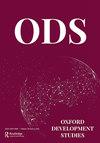短期无条件现金转移是否会改变行为和偏好?来自印度尼西亚的证据
IF 1.2
Q3 DEVELOPMENT STUDIES
引用次数: 1
摘要
短期无条件现金转移被用作不利经济冲击期间的临时缓解策略。然而,它们可能对行为和偏好造成意想不到的不利影响。我们估计了在印度尼西亚接受短期无条件现金转移对行为、风险厌恶和跨期选择的影响。该国于2005年首次引入该计划,并在不利的经济冲击发生时继续使用该计划。该项目有1550万户受益家庭,是世界上规模最大的项目之一。我们使用了一个跨越1997 - 2014年的个人纵向数据集。为了确定因果关系,我们将粗精确匹配与差中的差相结合。我们没有发现短期无条件现金转移影响受益人行为或偏好的证据。我们的研究结果表明,短期无条件现金转移支付在缓解不利经济冲击方面具有积极作用,应继续作为政府社会保障计划组合的一部分。本文章由计算机程序翻译,如有差异,请以英文原文为准。
Do short-term unconditional cash transfers change behaviour and preferences? evidence from Indonesia
ABSTRACT Short-term unconditional cash transfers are used as a temporary mitigation strategy during adverse economic shocks. They can however, cause adverse unintended impacts on behaviour and preferences. We estimate the effect of receiving short-term unconditional cash transfers on behaviour, risk aversion, and intertemporal choice in Indonesia. The country first introduced the program in 2005 and continues to use it whenever adverse economic shocks occur. With 15.5 million beneficiary households, the program remains one of the largest in the world. We use an individual-level longitudinal dataset spanning 1997 – 2014. To identify a causal relationship, we combine coarsened exact matching with difference-in-differences. We find no evidence that the short-term unconditional cash transfer affected beneficiaries’ behaviour or preferences. Together with evidence of its positive impact in mitigating the impact of adverse economic shocks, our findings show that short-term unconditional cash transfers should continue to be part of the government’s portfolio of social protection programs.
求助全文
通过发布文献求助,成功后即可免费获取论文全文。
去求助
来源期刊

Oxford Development Studies
DEVELOPMENT STUDIES-
CiteScore
2.70
自引率
0.00%
发文量
20
期刊介绍:
Oxford Development Studies is a multidisciplinary academic journal aimed at the student, research and policy-making community, which provides a forum for rigorous and critical analysis of conventional theories and policy issues in all aspects of development, and aims to contribute to new approaches. It covers a number of disciplines related to development, including economics, history, politics, anthropology and sociology, and will publish quantitative papers as well as surveys of literature.
 求助内容:
求助内容: 应助结果提醒方式:
应助结果提醒方式:


